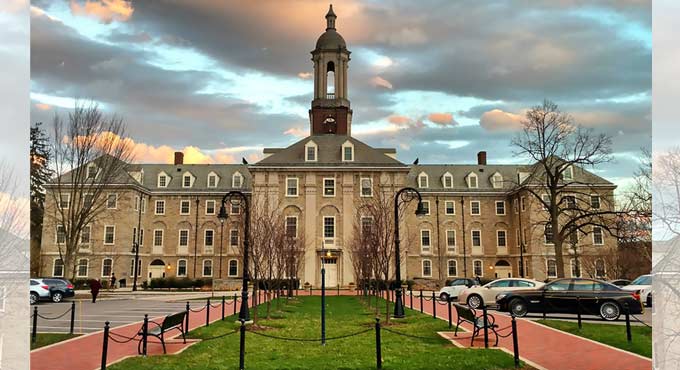Penn State University’s renamed One Health Microbiome Center affirms broad expertise
The Microbiome Center in the Huck Institutes of the Life Sciences at Penn State has announced its renaming to the One Health Microbiome Center (OHMC), the first center in the world to integrate “One Health” with the microbiome sciences. The new name reflects the center’s collaborative culture and aspirations to write its next chapter in the booming field of the microbiome sciences — the study of microbial communities that live throughout the world’s environments.
The center’s breadth of expertise will be utilized to understand and enhance the health of the environment, agricultural systems, and humans — the three pillars of One Health, which recognizes that ecosystems are closely-linked and interdependent, according to center Director Seth Bordenstein. This is especially relevant for microorganisms that can flow through the biosphere, impacting the health and well-being of diverse sectors.
“The center was founded to foster transformative, cross-college, interdisciplinary research and to provide infrastructure and resources that add value and impact for increasing the diversity, breadth, and reputation of microbiome scholarship at Penn State. It is now time to unlock and empower the momentum we have built in recent years to forge a first-in-kind, game-changing identity and mission that blends the strengths and aspirations of our community,” said Bordenstein.
The center’s membership has increased to more than 500 members, including 114 faculty from multiple Penn State campuses and over 42 departments. Fueled by a commitment to identify, synthesize and embolden an integrative molecular-to-ecosystem approach, said Bordenstein, the One Health Microbiome Center will jumpstart research and education focused on challenges and opportunities at the interface of agricultural, environmental, and human health.
“The OHMC is certainly one of the largest and most active life science centers in the field with layers of expertise enriched across Penn State’s scholarship,” said Andrew Read, director of the Huck Institutes of the Life Sciences.
Erika Ganda, assistant professor of animal sciences, said, “The sheer diversity of projects and expertise within the center is what sets it apart. As guest speakers can attest, within a single day at the One Health Microbiome Center, they connect with people working in oceans, agriculture, human genetics, landscape ecology and everything touched by the microbiomes of these environments.”
Examples of the center’s research include projects focused on optimizing soil and agricultural sustainability, supporting vital ecosystems in terrestrial and aquatic environments, and building resilience and solutions to combat chronic diseases and climate change.
Across the world and including the national Microbiome Centers Consortium, there are more than 80 centers and organizations dedicated to microbiome research and education. Many concentrate on one specific pillar of microbiome sciences, such as human microbiomes. The One Health Microbiome Center offers expertise in all three One Health pillars — agricultural, environmental and human health.
“The health of every living organism is influenced by its microbiome and is dependent on the ecosystem services provided by microorganisms in diverse environments,” said Mary Ann Bruns, professor of soil microbiology and biochemistry.
The “One Health” concept stresses the interconnectedness of life’s risks and solutions, according to Nichole Ginnan, the center’s project manager. Currently, a surge in integrative research at the interface of biological and environmental systems has spawned efforts to address the world’s pressing threats of climate change, food insecurity, evolution of antimicrobial resistance, and depletion of farm output, to name a few. National and international agencies that have responded to these challenges and opportunities include the National Academies of Sciences, Engineering, and Medicine committee focused on exploring linkages between soil health and human health; symposia and journal issues dedicated to One Health and the microbiome sciences; and the 2022 launch of the One Health Joint Plan of Action from the Food and Agriculture Organization of the United Nations, United Nations Environment Programme, the World Health Organization and the World Organisation for Animal Health.
“One Health is an approach that is relevant to everyone,” said Jasna Kovac, assistant professor of food science. “Elevating it as the mission of the center can help us leverage resources and collective expertise to accelerate interdisciplinary research geared at improving planetary well-being.”
Guy Townsend, assistant professor of biochemistry and molecular biology in the College of Medicine, added, “One Health unites our collective expertise across colleges to integrate the diverse research interests at Penn State and presents a vision focused on the interconnections between ecosystems, agriculture and medicine.”
The center’s primary objectives and achievements are to optimize, accelerate and disseminate knowledge and applications of the microbiome sciences from genomes to ecosystems. Identifying and distinguishing the center as the first One Health Microbiome Center puts the community at the nexus of the microbiome and One Health sciences, integrating two rapidly growing areas. This intersection will help attract top interdisciplinary scholars from students to faculty, drive training in biology without traditional education silos, and advance diverse and integrative funding streams. Moreover, according to Ginnan, the new name demonstrates Penn State’s strong leadership in integrating the sciences and science education to meet the workforce and innovation needs of the future.

